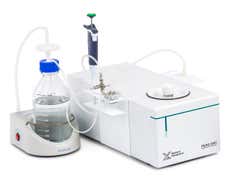Overview
The high-sensitivity MicroCal PEAQ-DSC system features automated data analysis to support the generation of high-integrity thermal stability data and deliver compliance with regulatory requirements, whilst allowing easy integration into existing data handling and transfer systems.
Unattended operation of the instrument after sample loading frees operator time. This complete system requires no additional accessories, reagents or consumables.
The PEAQ-DSC Automated, with an autosampler, is also available.
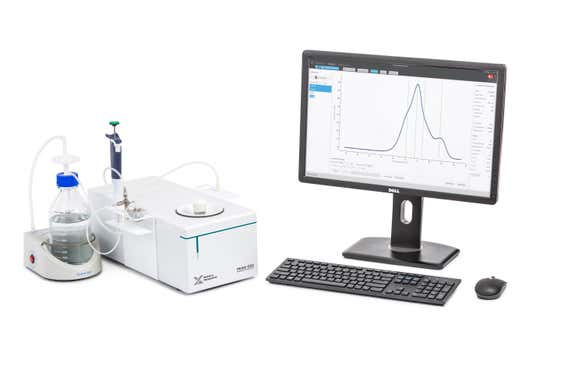
Features
-
Gold standard stability-indicating technique requiring minimal assay development
-
Direct and label-free quantification of biomolecular native-state stability in solution
-
Measurement of very tight binding constants, up to 1020 M-1
-
Manual system with pipette and cleaning device
-
Powerful MicroCal PEAQ-DSC software minimizes typical data analysis time
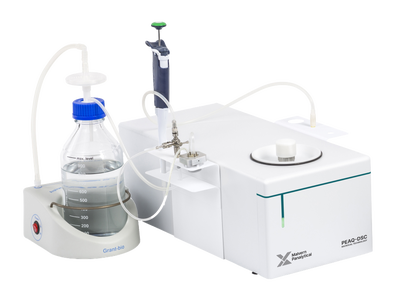
Data and software
Data generated by the MicroCal PEAQ-DSC provides critical guidance for biopharmaceutical development in protein engineering, (pre)formulation development, process development, manufacturing change control and biosimilarity and biocomparability studies.
The integrated software streamlines workflows, facilitates non-subjective data analysis, performance qualification and compliance with 21 CFR Part 11 and Annex 11 regulations, all delivering high integrity data and driving productivity in biopharmaceutical research.
Powerful MicroCal PEAQ-DSC software minimizes typical data analysis time and includes:
- PEAQ-Compliance: The system is available with Malvern Access Controller (MAC) to limit access to user-defined SOPs and data analysis features. Data can be displayed using the Report Generator with user details and the ability to sign using electronic signatures to facilitate the integration of the workflow into your company’s quality system and aid compliance with 21 CFR Part 11 and Annex 11 regulations. This is provided as an optional accessory
- PEAQ-Performance: Automatically detects and validates system readiness for optimal performance
- PEAQ-Smart (including PEAQ-Finder): For SOP-based operation and data analysis. Provides new algorithms to detect even subtle peaks and shoulders, facilitating the automatic, non-subjective identification of multiple transitions, such as those seen in multi-domain proteins
- PEAQ-Compare: For the quantitative comparison of DSC traces for comparability studies, ideal for batch-to-batch and biosimilarity studies
- Network-ready: email updates sent during the analysis to keep you informed of assay progress
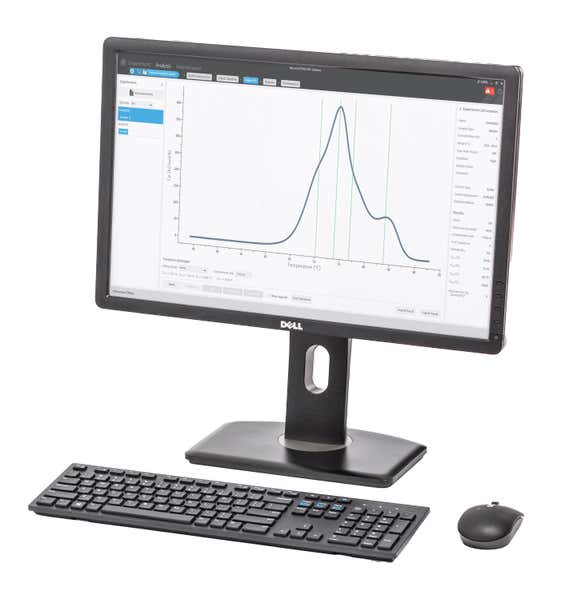
What is DSC?
Differential Scanning Calorimetry (DSC) is a powerful analytical tool for characterizing the thermal stability of proteins and other biomolecules. The technique measures the enthalpy (ΔH) and temperature (Tm) of thermally-induced structural transitions of molecules in solution. This information provides valuable insights into factors that stabilize or destabilize proteins, nucleic acids, micellar complexes and other macromolecular systems.
The data are used to predict shelf-life of biomolecular products including biopharmaceuticals, to enable batch-to-batch and biosimilar versus innovator molecule comparisons, to develop purification strategies, to characterize and evaluate protein constructs, and to rank the affinities of ligands to their protein targets in small molecule drug discovery programs.
Data analysis and measured/derived parameters are described in greater detail on the Differential Scanning Calorimetry technology page.
How it works
Functional structures formed by proteins and other macromolecules often undergo temperature-induced conformational changes, such as unfolding. These changes result in the absorption of heat as a result of the redistribution of non-covalent bonds within the molecule. Differential Scanning Calorimeters measure this heat uptake very precisely.
The thermal core of the PEAQ-DSC system contains a sample cell (containing the sample of interest) and a reference cell (containing a matched buffer solution), both of which are housed within an insulating jacket. These two cells are always maintained at the same temperature, and during a measurement, they are heated at a constant scan rate.
As the molecule within the sample cell unfolds, heat is absorbed, creating a temperature difference (ΔT) between the sample cell and the reference cell. This results in a thermal gradient across the Peltier units, creating a proportional voltage, which is in turn converted to power to form a feedback loop to the Peltier units, in order to return ΔT to zero.
Since protein unfolding is an endothermic event, it is observed as a positive displacement in the thermogram. The midpoint of this protein ‘melting’ transition is the Tm, and the area under the curve is the enthalpy (ΔH) of the unfolding process.
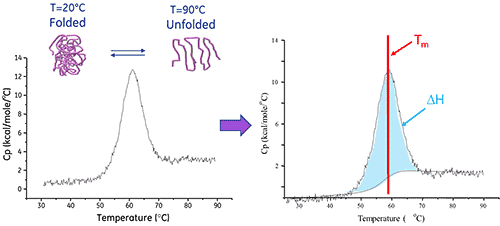
Applications
MicroCal PEAQ-DSC instruments provide value to a wide range of applications, some of which are outlined below.
Protein Characterization
MicroCal PEAQ-DSC is a fundamental tool for characterizing proteins. Key questions such as below can all be answered in simple DSC experiments.
- Is my protein folded?
- In what conditions is my protein stable?
- Is the protein multi domain?
- Does my protein bind a ligand or cofactor?
Liposomes
Liposomes are used as model membrane systems and as potential drug delivery systems. ‘Structure Activity Relationships’ (SAR) of membrane components and drug uptake into a liposomes can be investigated monitoring shifts in the phase transition temperatures and enthalpies measured by DSC. Indeed, any material that forms micelles or other macromolecular structures can be studied using the technique.
Application note: Using DSC to characterize thermotropic phase transitions in lipid bilayer membranes: The basics of liposome sample preparation and DSC studies

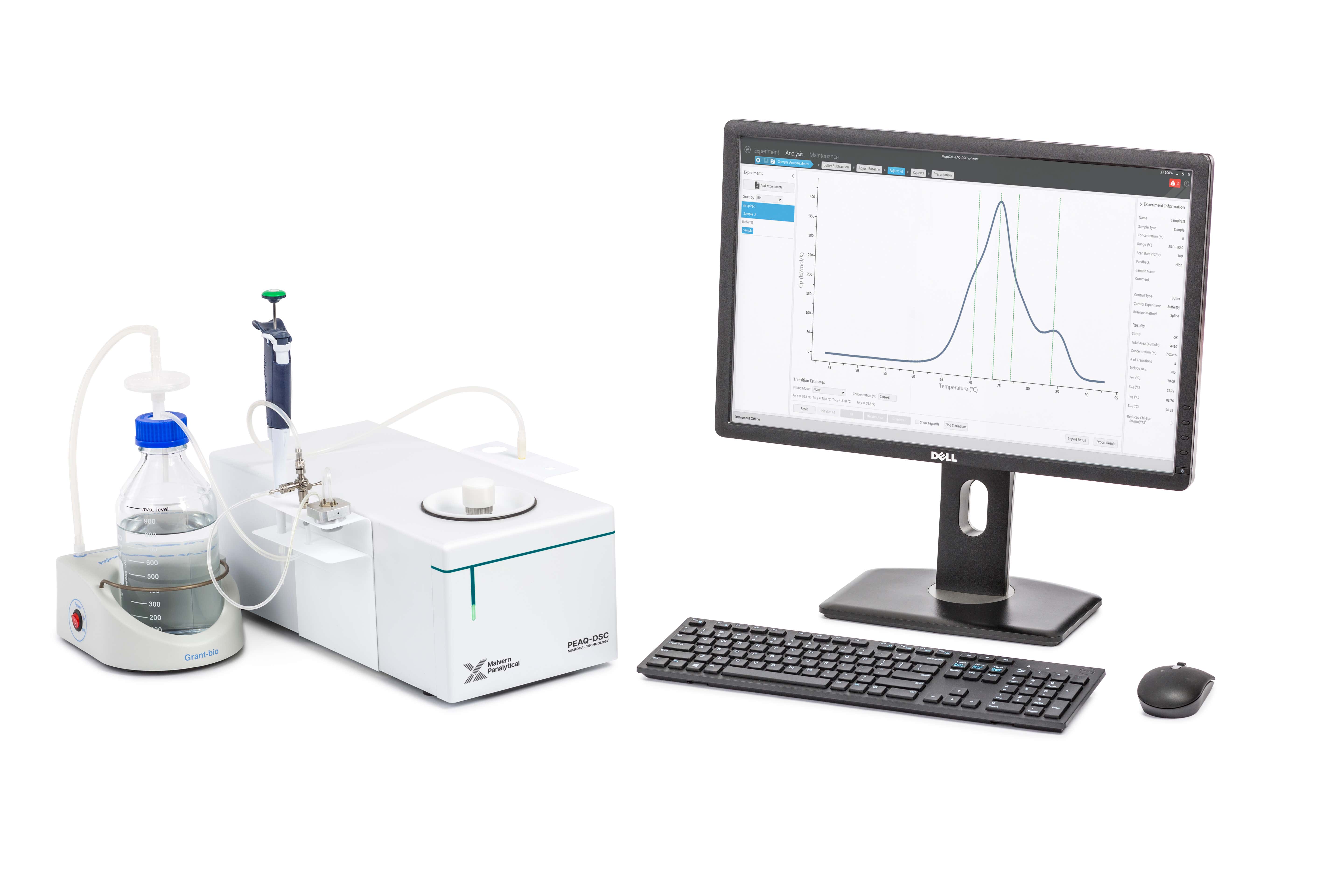



![[PN13012_2520_CLV_Photography_MP_JN.jpg] PN13012_2520_CLV_Photography_MP_JN.jpg](https://dam.malvernpanalytical.com/1b3bd0b0-1f31-43bf-a862-ae5100d0f47e/PN13012_2520_CLV_Photography_MP_JN_Original%20file.jpg)
